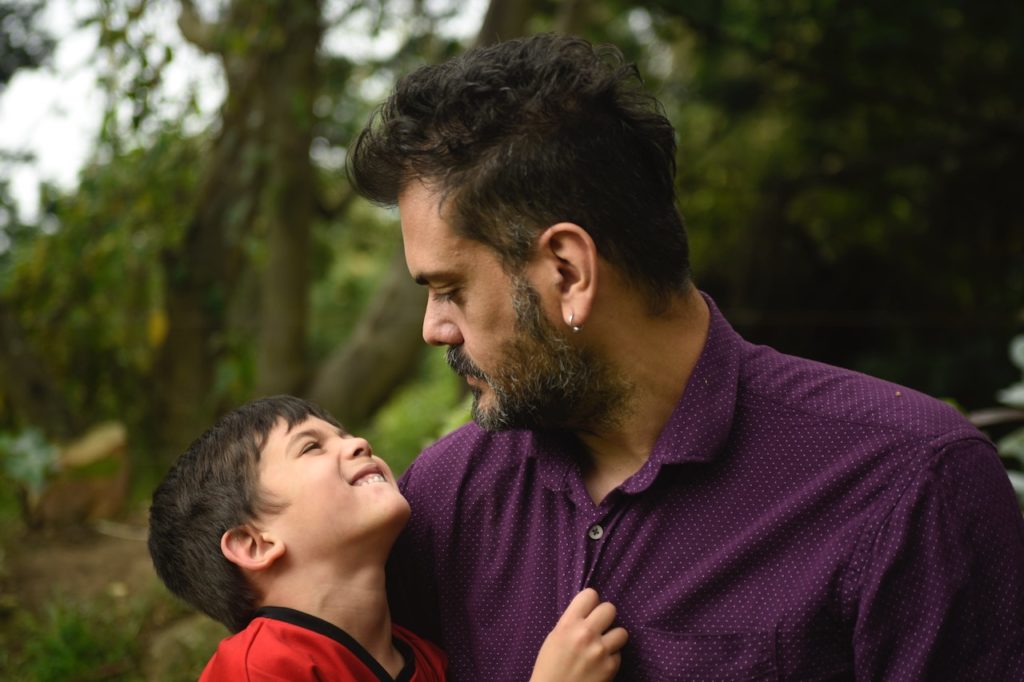In the United States, June brings with it warmer temperatures and the long-lit days of summer, high school proms and backyard barbecues, family and friends at a slower pace. Dads who work outside the home, capitalizing on longer daytime hours, can spend more time with their family. Kids newly liberated from the drudgery of the school routine have the opportunity to honor their fathers with a special day set aside on the second Sunday of the month. We all can enjoy the benefit of time to consider the best and most authentic way to celebrate dads.
This year, Father’s Day falls on June 16th, though my pre-programmed digital calendar did not announce it the way it does Mother’s Day in May. My youngest son brought home a lovely craft he made for his dad from school on the last day, made in advance for delivery during the long summer vacation, without any of the fanfare with which I was given elaborate gifts on Mother’s Day by both of my kids. On the surface, it might seem as if Father’s Day is just another national day of recognition, but there’s a different underlying tension with this one. Perhaps it’s the sense that giving visibility and recognition to the most powerful and visible members of our society — fathers — is redundant.
Mother’s Day originated in the peace-making efforts after the Civil War as part of abolitionist programs to reintegrate the marginalized, but the practice only took off nationwide decades later, when Anna Jarvis started to promote it. Inspired by her own mother’s sacrifices, Jarvis, who was herself childless, lobbied the media and politicians to get the holiday on the national calendar, highlighting the importance of honoring this female achievement when so many other days were designed to recognize men in their endeavors.
Jarvis finally got her suffragist efforts approved by connecting with a retailer in Philadelphia who inspired others to follow suit, finally persuading President Woodrow Wilson to sign the holiday into official existence in 1914. Wilson used the language of war, the type of male achievement that is typically honored by nations, to announce this yearly observance dedicated to the “tender, gentle army” of American mothers. The commercialization of the holiday, its yearly boon to the flower, chocolate, and telecommunications industries, was a later side effect, Jarvis denounced as it only detracted from her goal: to highlight the merits of women’s unrecognized labor. She was not as successful in that endeavor, but the celebration has become enshrined in both the hearts and spending habits of America.
The Biology of Father’s Day
The celebration of Father’s Day, too, has a biographical component, but from its inception it has been steeped in ambivalence on the part of both promoters and recipients. Originally suggested in a town in West Virginia in 1908 after a coal mine accident took the lives of more than 300 men, including many householders, it surfaced again as a possibility in 1910 in Spokane, Washington, when a woman raised as one of six by a widower suggested male parents also be honored. While no one opposed the measure in these two specific cases of atypical, super-father situations, retailers had their doubts that regular fathers would be capable of drumming up as much positive emotion (and, therefore, sales) as mothers do.
Piggybacking on national Mother’s Day celebrations, Father’s Day did spread, but even the nation’s fathers themselves were skeptical. In the 1920s, men rejected the efforts, claiming that flowers were feminizing, that the holiday was frivolous, and shunned the attention. Post-depression era retailers were ultimately won over some, marketing the celebration as a second Christmas for dad who could now be the proud owner of a new necktie. Others continued to resent the fact that these gifts were bought by wives and children with money they had earned themselves. Eventually, Richard Nixon signed Father’s Day into permanence. Today, Father’s Day sales account for around 1 billion dollars poured back into the economy, but Jarvis’ point still knocks around uncomfortably for many of us: do men, who create and contribute to the patriarchy that keeps the rest of us down really need a special day that honors the way they father?
Fatherlessness on Father’s Day
When investigating fathers and fatherhood, it is inevitable to stumble on the rate of fatherlessness in our country. Flagged as an epidemic by this study, fatherlessness has been on the rise across all demographics in the country, though Hispanic and black communities are much more affected than white ones. Of course, when thinking about celebrating fatherhood, absentee fathers are not the ones anyone is seeking to honor. But these missing fathers magnify the difficult job of celebrating fatherhood from within the patriarchal system that makes it so easy for a man to walk away from a family he helped to bring into existence. Thought it will certainly sound like a contradiction at first, what these fathers who refuse to father also show, is that celebrating fatherhood — real, honest and authentic fatherhood, not condescension or violence — is a giant step toward tearing down the patriarchy.

The notion that a system is patriarchal and that this father-power figure at the helm makes the situation oppressive for all “wives” and “children” is an old tale, present in governments, temples, organizations, and boardrooms of all styles and substance. This model, in which father rules with an iron fist and his underlings cower in obeisance has been replicated in miniature in the family structure of many cultures and perpetuated through the ages by inaction, complicity, and sheer force.
The typical patriarchal personality smacks of narcissism and aggression, the same profile of an alpha-male. Though women have done our fair share of going along with this system that does not benefit us and we can certainly also be patriarchal, these behaviors are most often associated with men. Sigmund Freud, who by today’s ethical standards would be in the category of a patriarchal clinician for betraying his female patients’ trust, was revolutionary in his time for actually listening to them in the first place. Before Freud, women weren’t heard with respect to their own treatment, much less in the realm of household or business matters.
What these social origins of our culture have done is to root us in this same voicelessness, this sense that men are the ones in control of so many aspects of the world, from politics to a vast array of professions, especially in the medical field. Already divided along gender lines, the system further backfires when some men, like ones frustrated in their professional realms, then try to impose the same iron will at home or leaving when they become overwhelmed with the financial and emotional demands of being a father. Either scenario brings about the discomfort with Father’s Day because they foster acts of violence towards others, whether in word and deed or through neglect.
Recasting the Male Figure
Taking a page from bell hooks’ notion that men fortify the patriarchy primarily through violence against themselves that becomes the violence they perpetrate, Aurelie Salvaire suggests that helping men to reconnect with their actual feelings can help them gain clarity about the other, unhelpful ways in which they impose their will. By observing the ways the system perpetuates itself — men are taught to repress emotion and in turn teach their sons the same — Salvaire lights the way in which killing the problem with kindness might be the solution.
Salvaire’s point, that men act out of anger because they are not allowed to express pain, also informs the stereotype that parenting, with the range of human emotions and subtlety it requires, is the work of women. Feeling that their emotional needs are different than women’s and children’s, considered weaker by men, has in reality resulted in men becoming disenfranchised from their role as fathers. The very patriarchy that they believe keeps them in power is taking away their most essential one — to feel their feelings — and perpetuates the system in a vicious circle of wrongly ascribing strength to stoicism. Remaining blind to the ways in which the patriarchy causes violence to us all is the first step in breaking the cycle.
In recent years, we have begun to understand that absenteeism by fathers is not only a disservice to their partner but a radical, life-changing factor in the development of their children. Despite the endless and painstaking work that single mothers do to get their families ahead, paternal abandonment has been found to negatively impact many aspects of a child’s life, including their ability to form their own long-lasting relationships. For so long and by default, though, society has privileged a mother’s love over that of a father’s, that perhaps many of us are not used to giving it fathers the necessary importance, such as when iCal programs in Mother’s Day but not one for fathers.
But the Kids are Not Okay
Research shows that disconnected and unavailable fathers have kids who are more likely to drop out of school or become incarcerated. This early-in-life and often lifelong rejection causes a serious psychological wake, in which a low self-esteem and poor self-image lead to higher propensity toward addiction, indigence, mental health issues, and even shorter life expectancy. What would most men, who are used to thinking that they are living their best lives in their emotional cage, that their greatest power is to walk away from kids rather than raising them, think if they realized the real power is in helping grow a balanced human being? That their real freedom is to stick around and feel what fathering someone feels like?
That America’s kids would benefit from the re-engagement of fatherhood is true beyond a doubt, but the proposal here is that men would benefit just as much or more. There are fathers around the world who have already realized this and certainly there have been changes to the cultural norms that inform what a father does and who he is. Our current times have seen fathers who are single dads, who are gay, and who are not the primary breadwinners. This redefinition of the classic roles has already been underway for some time and will likely continue in that direction, as marriage equality and civil rights in general continue to progress.
Practically speaking, these adjustments challenge the very narrow patriarchal definitions of what a father’s level of involvement can and should be, even in cases where the dad doesn’t reside with his children. By giving fathers more opportunities to father, whether it’s through joint custody, special time set aside, or greater hours spent working from home or providing primary care to children, we are giving men more chances to embody the role we so long have wished they would take. This shift makes the day-to-day life of women co-parenting with men much easier, more equal and democratic, and so chips away at the narrow confines of the patriarchal structure.
Enter Kindness and Love
Just as it doesn’t seem to follow that men’s violence is rooted in their own discomfort from feeling the feelings that violence produces, we can interrupt the cycle of violence with kindness and love. Insisting on celebrating Father’s Day, despite mid-century men’s bah-humbug reaction to having an honorary date all of their own, was not counterproductive after all. In fact, it would seem that creating the opportunity for men to be recognized for all of the positivity they are capable of wielding might be one incentive to get them to actually bring that positivity and live up to being fathers rather than patriarchs.
In an insightful opEd piece for the L.A.Times, Stephen Marche recommends fatherhood precisely as antidote to the poison of the patriarchy. In looking to the Aka tribe in Africa, one of the few cultures that is patriarchal in the benevolent sense, he observes that the biggest difference between them and cultures in which child care is relegated disproportionately to women and this one lies in the vast amounts of time children spend with their fathers. Time. More than any specific activity, the Aka spend 50% of their day practically in bodily contact with their offspring. The result, when compared to other cultures in Central Africa, the Aka society is amongst the most egalitarian.
In a conventional society, in which women stay home with the children and the men go out in search of sustenance, the definition of manliness or adult masculinity appears to the younger generations, who look to their elders for a model of behavior, the rejection of femininity. Home and child-rearing become coded as female enterprises, while all those other things are coded male, and so the cycle of devaluing the feminine is perpetuated over the generations, especially as it’s not associated with bringing home the bacon or powerful positions.
The Aka don’t have father figures like dictators or CEOs or presidents, the kinds of patriarchs who Marche calls “distant”. They have fathers whose physical proximity is nurturing in a male way but opens up a domestic intimacy, as space that is not usually afforded to men in cultures where they disconnected from the work of child-rearing. The effects that this alternative family structure provides the culture as a whole is measurable in the harmony and gender equality the Aka enjoy.
Similarly, the more progressive among Western cultures have figured out the link between shifting the pressures that society puts on each gender to take on separate roles in the family, and they are enjoying an equally egalitarian shift in work culture and society at large. Problems like the gender pay gap are assuaged by equally-divided parenting leave, for example. Giving fathers in Sweden and Japan paternity leave is a social support that enables to keep their careers going as well and provides that golden time that fathers and their children need to create real emotional bonds.
While I agree that motherhood is the hardest job in the world, made only more complicated by unwilling, unfit, or overbearing partners, when we remove the possibility of celebrating fatherhood we also relieve a whole gender of any expectation that they can and should do better. And though it’s true that men have long levied their own emotional limitations into a hold on political and social power, what need is to jiu-jitsu it and turn it around on them. The way to dismantle the patriarchy is to make better space for fatherly love, allow it room in the family structure and celebrate fathers’ contributions in society. We give fathers more room to love so they can receive it, too. This way we build up our men enough to be the “tender, gentle army” of fathers we need.
For Image credit or remove please email for immediate removal - info@belatina.com








































